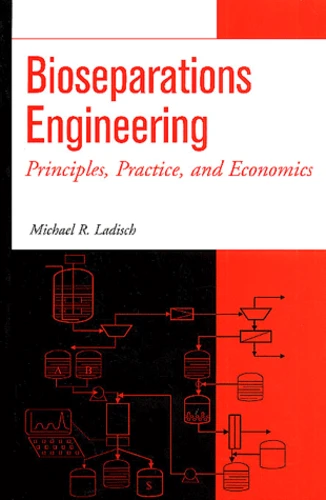Bioseparations Engineering. Principles, Practice, And Economics
Par :Formats :
- Paiement en ligne :
- Livraison à domicile ou en point Mondial Relay indisponible
- Retrait Click and Collect en magasin gratuit
- Nombre de pages735
- PrésentationRelié
- Poids1.23 kg
- Dimensions16,4 cm × 24,2 cm × 4,1 cm
- ISBN0-471-24476-7
- EAN9780471244769
- Date de parution01/01/2001
- ÉditeurWiley
Résumé
Knowledge of the genetic basis of biological functioning continues to grow at an astronomical rate, as do the challenges and opportunities of applying this information to the production of therapeutic compounds, speciality biochemicals, functional food ingredients, environmentally friendly biocatalysts, and new bioproducts from renewable resources. While genetic engineering of living organisms transforms the science of genomics into treatments for cancer, diabetes, and heart disease, or products for industry and agriculture, the science and technology of bioseparations are the keys to delivering these products in a purified form suitable for use by people.
The methods, theory, and materials that reduce the science of bioseparations to practice, whether in the laboratory or the plant, are the subjects of Bioseparations Engineering. Examples address purification of biomolecules ranging from recombinant proteins to gene therapy products, with footnotes detailing economics of the products. Mechanistic analysis and engineering design methods are given for: Isocratic and gradient chromatography; Sedimentation, centrifugation, and filtration; Membrane systems; Precipitation and crystallization.
Topics addressed within this framework are: stationary phase selection; separations development; modeling of ion exchange, size exclusion, reversed phase, hydrophobic interaction, and affinity chromatography; the impact of regulatory issues on chromatography process design; organization of separation strategies into logical sequences of purification steps; and bridges between molecular biology, combinatorial methods, and separations science.
A result of teaching and developing the subject matter over ten years, Bioseparations Engineering is an ideal text for graduate students, as well as a timely desk book for process engineers, process scientists, researchers, and research associates in the pharmaceutical, food, and life sciences industries.
Knowledge of the genetic basis of biological functioning continues to grow at an astronomical rate, as do the challenges and opportunities of applying this information to the production of therapeutic compounds, speciality biochemicals, functional food ingredients, environmentally friendly biocatalysts, and new bioproducts from renewable resources. While genetic engineering of living organisms transforms the science of genomics into treatments for cancer, diabetes, and heart disease, or products for industry and agriculture, the science and technology of bioseparations are the keys to delivering these products in a purified form suitable for use by people.
The methods, theory, and materials that reduce the science of bioseparations to practice, whether in the laboratory or the plant, are the subjects of Bioseparations Engineering. Examples address purification of biomolecules ranging from recombinant proteins to gene therapy products, with footnotes detailing economics of the products. Mechanistic analysis and engineering design methods are given for: Isocratic and gradient chromatography; Sedimentation, centrifugation, and filtration; Membrane systems; Precipitation and crystallization.
Topics addressed within this framework are: stationary phase selection; separations development; modeling of ion exchange, size exclusion, reversed phase, hydrophobic interaction, and affinity chromatography; the impact of regulatory issues on chromatography process design; organization of separation strategies into logical sequences of purification steps; and bridges between molecular biology, combinatorial methods, and separations science.
A result of teaching and developing the subject matter over ten years, Bioseparations Engineering is an ideal text for graduate students, as well as a timely desk book for process engineers, process scientists, researchers, and research associates in the pharmaceutical, food, and life sciences industries.

